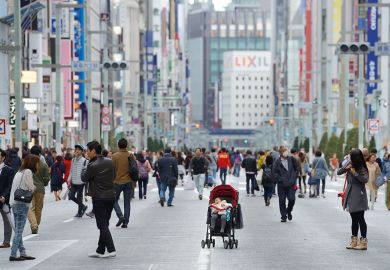Japanese politicians are unlikely to address university funding concerns in their election campaigns as higher education issues slip down the political agenda, according to academics.
Japan’s new prime minister, Shigeru Ishiba, has called a snap election, set to take place on 27 October, after a series of political scandals saw the public lose trust in the ruling party, the LDP.
The LDP is widely expected to win the election, meaning higher education policies are likely to follow the status quo, despite the country’s universities calling for greater support and ongoing concerns over tuition fees, which have been largely frozen for two decades.
Earlier this year, the Japan Association of National Universities claimed that government funding cuts and high inflation were pushing institutions to their limit.
It said government subsidies have fallen by 13 per cent since 2004, while expenses – including staff wages – continue to rise.
Some universities have responded to the situation by increasing fees. Most recently, the University of Tokyo announced that it would hike fees by 20 per cent above the national cap, as allowed under government regulations.
However, the funding crisis was “not a high priority for the current government or future leaders”, said Futao Huang, vice-director of the Research Institute for Higher Education at Hiroshima University.
“The number of national universities is decreasing, and their overall share in the sector is relatively small, so the issue isn’t widely concerning to the general public beyond the university sector,” he said.
“Public universities have financial problems, to which neither the LDP nor the other main opposition parties are likely to respond directly,” agreed Takakazu Yamagishi, a political scientist at Nanzan University. “I think the general public is interested in subsidies for their tuition payment, but I don’t think there is significant support for increased government support for universities.”
If extra funding is provided, it was thought likely to be targeted at widening participation.
“Under these conditions, governments and political parties tend to appeal to voters and citizens by increasing financial support directly to individual learners rather than to universities and higher education institutions,” said Akiyoshi Yonezawa, professor and vice-director of the International Strategy Office at Tohoku University.
Meanwhile, the Education Ministry has set up a task force to plan the future of higher education as the country reckons with population decline.
“However, there seems to be no clear vision other than the inevitable downsizing of undergraduate programmes and the shift to graduate education and reskilling of adult workers,” said Professor Yonezawa.
Nor have opposition parties produced viable alternatives, according to Professor Huang, who believed they were “more focused on political reforms and gaining power rather than offering substantial alternative policies for higher education at this time”.
If re-elected, the government looks likely to continue focusing on the country’s top universities, leaving the others to fight for survival.
“The LDP is basically expected to increase support for universities in relation to innovative science and technology, which is directly linked to the economy,” said Professor Yamagishi. “However, it is not strongly inclined to financially support other fields of study or small universities that are not strong enough.”
In the longer term, the election could also shape future relationships with China, as factions of the ruling party call for a heightened focus on national security, with potential implications for the large numbers of Chinese students and academics in the country.




